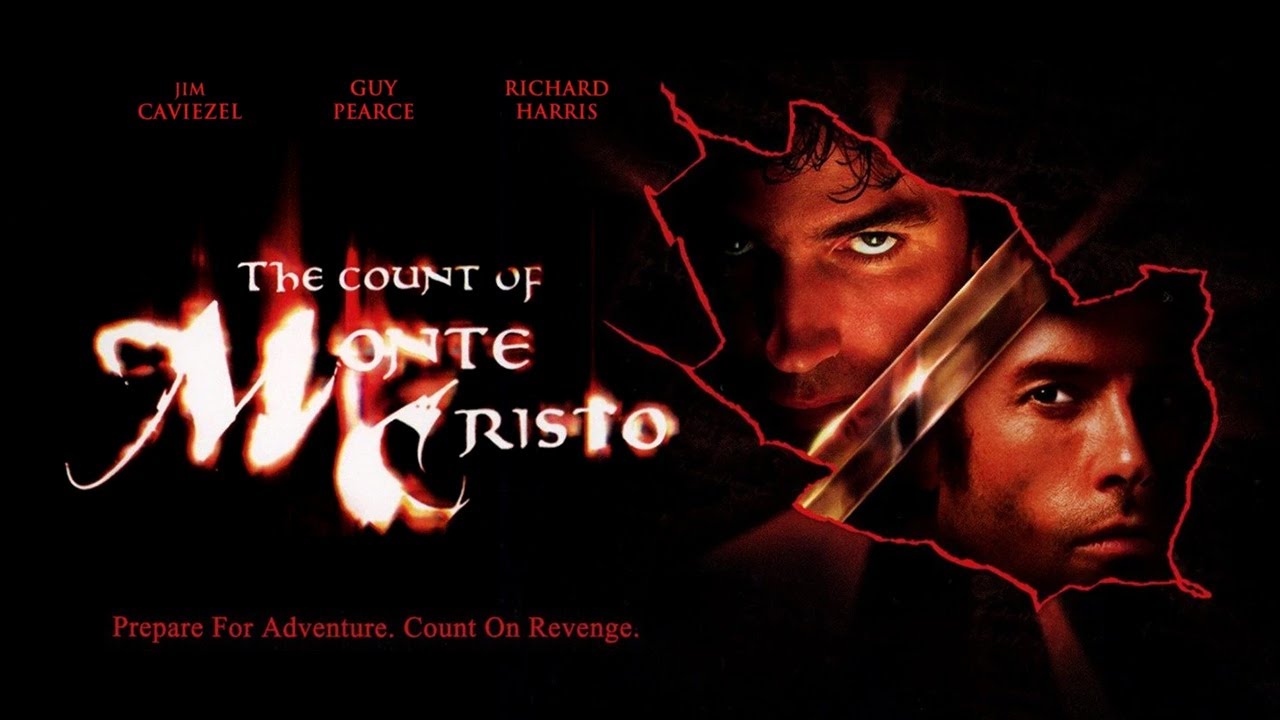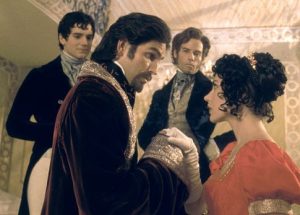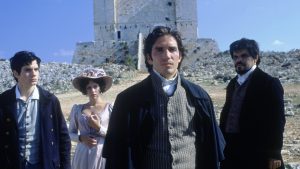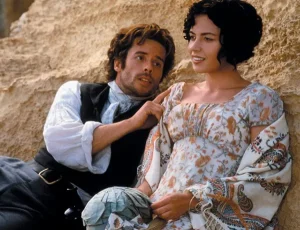“The Count of Monte Cristo” (2002)

Review of The Count of Monte Cristo (2002)
General Information
- Director: Kevin Reynolds
- Main Cast:
- Jim Caviezel (Edmond Dantès / The Count of Monte Cristo)
- Guy Pearce (Fernand Mondego)
- Richard Harris (Abbé Faria)
- Luis Guzmán (Jacopo)
- Dagmara Domińczyk (Mercédès)
- James Frain (Villefort)
- Genre: Adventure, Drama, Thriller
- Runtime: 131 minutes
- Studio: Touchstone Pictures
Plot
The Count of Monte Cristo is an adaptation of Alexandre Dumas’ classic 1844 novel. The film tells the story of Edmond Dantès (Jim Caviezel), a young and successful merchant sailor in 1815 France who is falsely accused of treason. Betrayed by his closest friends and sent to the Château d’If, a notorious prison, Dantès is imprisoned for years without trial.
While in prison, he meets the wise and resourceful Abbé Faria (Richard Harris), who educates him in languages, science, and philosophy, and reveals the location of a hidden fortune on the island of Monte Cristo. Upon the death of Faria, Dantès escapes the prison, finds the treasure, and reinvents himself as the Count of Monte Cristo. Using his newfound wealth and power, Dantès embarks on a calculated and elaborate plan of vengeance against those who betrayed him, including his former best friend Fernand Mondego (Guy Pearce), who is now a powerful nobleman.
As Dantès seeks justice, he struggles with the morality of revenge, his feelings for his lost love, Mercédès (Dagmara Domińczyk), and his inner transformation. The film combines action, adventure, romance, and themes of justice and revenge.
Highlights
- Jim Caviezel’s Performance
- Jim Caviezel gives a compelling and layered performance as Edmond Dantès. His portrayal of the character captures Dantès’ transformation from an innocent, betrayed man into a calculated and enigmatic figure seeking vengeance. Caviezel brings intensity and depth to Dantès’ emotional journey, and his performance anchors the film’s narrative. As the Count of Monte Cristo, he embodies a character who is both ruthless and noble, offering the audience a sympathetic antihero.
- Guy Pearce as Fernand Mondego
- Guy Pearce plays Fernand Mondego, Dantès’ former best friend turned rival. Pearce’s performance adds an extra layer of complexity to the character, portraying Fernand as a man consumed by jealousy and ambition. His transformation from a sympathetic character to the villain of the story is well-executed, and his role as the antagonist serves as a strong counterpoint to Dantès’ quest for revenge.
- Stunning Cinematography and Locations
- The film’s cinematography, particularly the scenes set in the Mediterranean and the French countryside, is breathtaking. The film makes excellent use of its locations, which help to create an immersive and visually rich world. The beautiful landscapes contrast with the darker, more dramatic moments, highlighting the emotional highs and lows of Dantès’ journey. The lavish set design and costumes further enhance the period setting and atmosphere, adding depth to the story.
- The Themes of Revenge and Redemption
- The Count of Monte Cristo explores timeless themes of betrayal, vengeance, and redemption. Edmond Dantès’ quest for revenge is both thrilling and morally complex. The film delves into the consequences of revenge, questioning whether it can truly bring peace or satisfaction. Dantès’ internal conflict over his pursuit of justice versus his growing detachment from the humanity he once knew adds a deep philosophical layer to the narrative. The film also explores the theme of redemption, showing that despite the destruction wrought by revenge, there is still a chance for personal reconciliation.
- Action and Adventure
- The film maintains a strong sense of adventure and action throughout, with sword fights, daring escapes, and thrilling confrontations. The pacing is brisk, ensuring that the narrative never stagnates, even during the film’s more reflective moments. The sequences of Dantès’ transformation into the Count of Monte Cristo, including his training and the acquisition of his fortune, are exciting and gripping, creating a strong sense of empowerment for the character.

- The film maintains a strong sense of adventure and action throughout, with sword fights, daring escapes, and thrilling confrontations. The pacing is brisk, ensuring that the narrative never stagnates, even during the film’s more reflective moments. The sequences of Dantès’ transformation into the Count of Monte Cristo, including his training and the acquisition of his fortune, are exciting and gripping, creating a strong sense of empowerment for the character.
Criticisms
- Simplification of the Source Material
- While the film adapts The Count of Monte Cristo faithfully in many respects, certain aspects of the original novel are simplified or condensed for the sake of runtime and clarity. Some of the more intricate details of the plot and the political intrigue from the book are reduced or omitted, which may disappoint viewers who are familiar with the novel. The film also focuses more on the action and revenge elements, which, while engaging, slightly diminish the depth of the philosophical themes explored in Dumas’ work.
- Character Development for Supporting Cast
- While Caviezel and Pearce shine in their roles, some of the supporting characters, particularly Mercédès and Jacopo (Luis Guzmán), are not as fully developed. Mercédès, who plays a significant role in Dantès’ life, does not have the same emotional depth as in the novel, and her role in the film feels secondary to Dantès’ quest for vengeance. Similarly, Jacopo, who becomes Dantès’ loyal ally, doesn’t have enough screen time or development to make a lasting impact on the story.
- Romantic Subplot
- The romantic subplot between Dantès and Mercédès, while integral to Dantès’ motivations, sometimes feels secondary to the action-driven plot. Their reunion, though emotional, lacks the depth it might have had if more time had been spent exploring their relationship and the years of separation between them.

- The romantic subplot between Dantès and Mercédès, while integral to Dantès’ motivations, sometimes feels secondary to the action-driven plot. Their reunion, though emotional, lacks the depth it might have had if more time had been spent exploring their relationship and the years of separation between them.
Verdict
The Count of Monte Cristo (2002) is an engaging and thrilling adaptation of Alexandre Dumas’ classic novel. Jim Caviezel’s compelling portrayal of Edmond Dantès, combined with stunning visuals, strong action, and an exploration of timeless themes of vengeance and redemption, makes for an entertaining and emotionally resonant film. While some of the characters are underdeveloped and the plot simplifies aspects of the original story, the film succeeds in delivering a captivating, action-packed drama with a deep moral center. It’s a satisfying and heartfelt journey of revenge, forgiveness, and personal growth, offering a modern retelling of a classic tale with universal appeal.
Rating: 8/10










